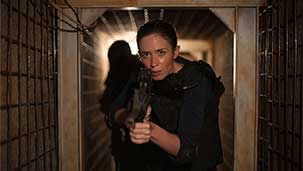In a film as morally oblique as Sicario, it is imperative for the audience to have someone to attach themselves to as the story unfolds. Your character, Kate Mercer—a driven but relatively inexperienced FBI agent—is that anchor. When she is seconded to the DOD, ostensibly as an expert in hostage situations, it seems as if she is being given an opportunity to actually make a dent in the upper echelons of the Mexican cartels.
Initially the operation appears pretty straightforward—but it quickly becomes clear to both Kate, and the audience, that nothing is what it seems.
Throughout the film—and this is one of the many devices used to maintain an uncomfortable tension—Kate is constantly frustrated in her attempts to obtain even the most basic information from her new colleagues. This opaqueness, rather than discouraging her, makes Kate more determined to penetrate the byzantine world she has been drawn into. Her persistence is admirable but it is also the lever used to manipulate her. Kate’s principled commitment to her vocation is her Achilles heel.
Sicario is a difficult film for a number of reasons. The central theme is the unmitigated disaster that the perpetual war on drugs has engendered in the countries involved as well as the various law enforcement agencies engaged in that never-ending conflict. The policy failure at all levels and the collateral damage those policies inflict on the civilian populations is a given in this film—regardless of the empty bravado of characters like Josh Brolin’s DOD agent and the peculiar Colombian Alejandro (Benicio Del Toro, doing his best work in years). There are no heroes in Sicario. The characters are either morally bankrupt, ineffectual, enmeshed in events beyond their control, or simply too civilized to survive the snake pit that the Mexican/US border has become.
The violence that these policies spawn is present from the beginning of the film and is ubiquitous throughout. And despite Roger Deakins extraordinary cinematography and Denis Villeneuve’s superlative direction, that brutality is nothing but ugly. There are a number of technically superior sequences in Sicario but none of them leave you feeling anything but unsettled. There is never a moment where the violence achieves anything other than multiplying the root difficulties. Each death simply leads to more of the same, whatever the empty ambitions and rationales of the men involved. And it is always a man, and a very particular sort of man, that initiates the violence.
That’s why your character is so important, Emily. Not only is Kate the only women involved who isn’t simply a bystander, but she also comes to stand for most of us; competent, engaged, but out of her depth and completely unable to operate with the casual viciousness required to survive in the moral vacuum these men seem to thrive in.
Sicario is what enforcement becomes when separated from the rule of law—a series of vendettas and power plays that see whole families butchered in the name of expedience and the vague goal of some sort of manageable equilibrium. That your character is unable to swim with this particular school of sharks is neither a character flaw nor a weakness, it is simply the consequence of living within boundaries most of us never see a need to test. Kate’s final choice in the film is the only one a moral human could make, yet it is also the reason we may all fall.
Sincerely,

Tim







